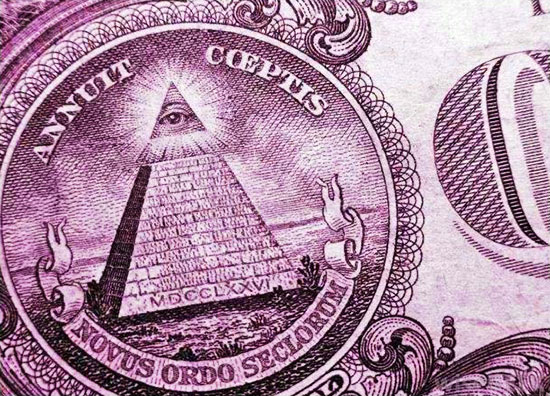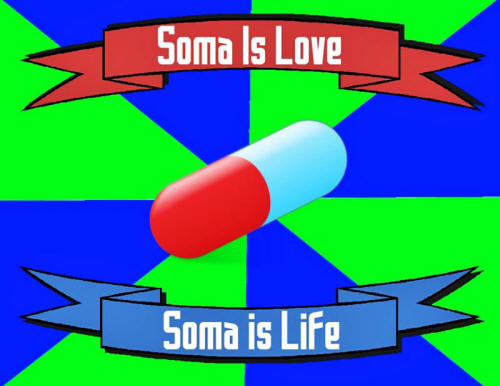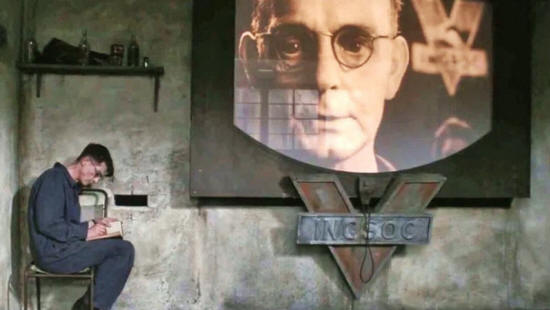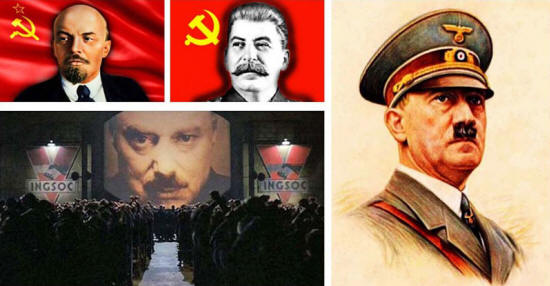|
from
TheTollOnLine
Website
Many Americans today would quite possibly consider Aldous Huxley's "Brave New World" to be a utopia of sorts with its limitless drugs, guilt-free sex, perpetual entertainment and a genetically engineered society designed for maximum economic efficiency and social harmony.
Conversely, most free people today would view George Orwell's "1984" as a dystopian nightmare, and shudder to contemplate the terrifying existence under the iron fist of "Big Brother"; the ubiquitous figurehead of a perfectly totalitarian government.
Although both men were of British descent, Huxley was nine years older than Orwell and published Brave New World in 1932, seventeen years before 1984 was released in 1949.
Both books are widely considered classics and are included in the Modern Library's top ten great novels of the twentieth century.
Brave New World
Aldous Huxley was born to academic parents and he was the grandson of Thomas Henry Huxley, a famous biologist and an enthusiastic proponent of Darwin's Theory of Evolution who was known as "Darwin's Bulldog".
Huxley's own father had a well-equipped botanical laboratory where young Aldous began his education.
Given the Huxley family's appreciation for science, it makes perfect sense that Brave New World began in what is called the "Central London Hatchery and Conditioning Centre" where human beings are artificially grown and genetically predestined into five societal castes consisting of:
Initially, the story centers on Bernard Marx, who is a slightly genetically flawed Alpha Plus psychologist with an inferiority complex due to his short stature.
By the end of the novel, however, the protagonist becomes a boy named "John the Savage" who is the bastard child of the "Director of the Central London Hatchery", and a lady named Linda, who naturally birthed John on a remote American Indian Reservation.
When Bernard discovers the true identities of John and Linda, he arranges to fly them back to London in order to leverage his position with John's biological father, the Hatchery Director.
Bernard is in love with a beautiful fetus technician named Lenina Crowne, who, upon meeting John the Savage falls madly in lust.
Lenina is a gal who enjoys multiple lovers because, in the Brave New World,
In other words, sexual promiscuity is encouraged as sort of a societal "pressure relief valve" designed to discourage negative emotions such as jealousy and envy.
John the Savage, however, suppresses his sexual attraction to Lenina because he considers her a slut.
Eventually, John's sexual repression contributes to him violently attacking some children of the Delta caste who were waiting in line for their "Soma", a mood-altering drug; and the outburst causes both Bernard and John to be brought before the powerful Mustapha Mond, who is one of ten world controllers.
A debate ensues between John and Mr. Mond who explains to the Savage that a stable society requires the controlled suppression of science, religion, and art.
John, who is an avid admirer of William Shakespeare, argues that human life is not worth living without these things.
In Brave New World, the State achieves a harmonic equilibrium via the economic parity of production and consumption while utilizing Eugenics as a means to counterbalance the life and death of the citizens.
Technology is employed as a means of control in lieu of any search for scientific, or spiritual, truth; as these are considered a threat to the established order.
People are cloned in hatcheries in accordance to the needs of the State and trained into obedience through "Hypnopedia", or sleep-teaching.
Happiness is valued over dignity and morality, and emotions are regulated through the use of the drug, Soma, amid constant entertainment including superficial games and virtual reality venues called the "feelies".
Although there is no God or religion, per se, in Brave New World, Henry Ford is canonized in the place of a deity as a testament to corporate efficiency, assembly line production and rampant consumerism.
1984
Like Huxley, George Orwell also envisioned a future where government monitored and controlled every aspect of human life; yet the world is much more terrifying in 1984.
Orwell actually volunteered and fought in the Spanish Civil War in 1936 before being injured by a sniper's bullet in May of 1937; it was there where he witnessed, first-hand, the ghastly barbarism of political fascism.
Moreover, he previously observed the rise of Joseph Stalin in the Soviet Union and, later, Adolf Hitler in Germany.
In turn, Orwell published Animal Farm in 1945 and four years later, his novel 1984, as literary warnings to mankind.
The setting of 1984 takes place in a futuristic, post-apocalyptic Great Britain which, at that time, was part of "Oceania"; one of three world super-states all engaged in never-ending warfare.
The protagonist of the novel is Winston Smith, a middle-class member in the Outer Party of INGSOC, a totalitarian regime led by the figurehead known only as "Big Brother".
Winston works in the Records Department of the "Ministry of Truth" where he revises history on behalf of the Party while under constant surveillance both at work and home.
Everywhere he goes; there are posters with a photo of the party's leader and the words:
In an act of rebellion, Winston acquires a diary and begins to record what Big Brother and the INGSOC party would label as "crimethink" and "thoughtcrime".
Eventually, Winston meets and falls in love with a beautiful coworker named Julia, and they engage in what they believe to be a secret affair whereby they have illicit sex as a form of political rebellion.
In 1984, the Party members living in Oceania are brainwashed to have sex only for procreation and this is how sexual repression is channeled into enthusiasm for the State.
Under the threat of detection by the "Thought Police", torture and even "vaporization", which would eliminate every last vestige of proof he ever existed, Winston persists in his rebellion against the Party with certain fatalism.
In fact, just before he and Julia are captured by the militant, jackbooted INGSOC Party authoritarians, Winston told Julia "we are the dead"; to which she replied the same words back to him.
Throughout Orwell's dark narrative, various themes are explored such as "Newspeak" which is a language of mind control; the terrifying tyranny of totalitarianism; historical revisionism; torture, and psychological manipulation.
The INGSOC Party's prisonlike control and complete invasion of individual privacy is such that a citizen's own facial expression could betray their inner disloyalty to the Party through what Orwell labeled as "crimeface":
Orwell was near prophetic in describing the proliferation of listening devices in both public and private settings as well as "telescreens", which simultaneously broadcast propaganda while relaying live video feeds back to the Party watchers.
In Orwell's chilling story, free will and individuality are sacrificed to the extreme demands of Collectivism and in deference to complete societal control by an authoritarian government.
Compared and Contrasted
In both, Brave New World and 1984, common themes are addressed including government, orthodoxy, social hierarchy, economics, love, sex, and power.
Both books portray propaganda as a necessary tool of government to shape the collective minds of the citizenry within each respective society and towards the specific goals of the state:
In Brave New World, the "Bureaux of Propaganda" shared a building with the "College of Emotional Engineering" and all media outlets including radio, television, and newspaper.
Much of the brainwashing of the citizens in Huxley's world included messaging to stay within their genetically predetermined castes or to encourage the daily use of the drug, Soma, in order to anesthetize emotional agitation:
The "Ministry of Truth", in 1984, also known as "minitrue" in Newspeak, served as the propaganda machine for Big Brother and the INGSOC regime.
Although its main purpose was to rewrite history in order to realign it with Party doctrine and make the Party look infallible, the Ministry of Truth also promoted war hysteria in order to unite the citizens of Oceania while broadcasting simple messages designed to discourage any self-determination or autonomous thought.
Whereas the citizens of Brave New World used the drug Soma and cursory material distractions to vanquish any desire for real knowledge or truth; the "memory hole" in 1984 was a chute connected to an incinerator and served as the mechanism by which the Ministry of Truth would abolish historical archives as if they never existed.
In other words, truth was unimportant to the citizens of Brave New World and it was summarily rescinded from the realm of 1984.
Furthermore, in order to additionally fill the empty existence of those living in Brave New World, Huxley envisioned a character by the name of Helmholtz Watson as a creator of hypnopaedic phrases designed to fill the mental and emotional vacuum vacated by knowledge:
In 1984, however, Orwell conceived of a character named Syme, who was an enthusiastic Newspeak redactor of language:
In Brave New World, Helmholtz Watson worked to fill the mind of people with hypnotic messages. In 1984, Syme strived to remove words from the English language in order to eliminate what the Party considered to be "thoughtcrime".
Although the methodologies varied, mind control was prevalent throughout both the fictional worlds of Huxley and Orwell.
Social hierarchies were also present in both futuristic novels. The citizens of Brave New World consisted of the Alpha caste which held the highest jobs in the world state, and Betas, who were allowed to interact with the Alphas.
The Gamma's were considered to have average intelligence, they were eight inches shorter than Alpha's in height, and they maintained the office jobs and held administrative positions.
The Delta's were trained from a very young age to despise books and were conditioned to work in manufacturing, while the Epsilon caste members were considered as morons who performed the menial labor within the lowest strata of society.
Although 1984 doesn't have a caste system, per se, the citizenry were still separated into three groups:
The Proles constituted 85% of the population and were allowed privacy and anonymity, yet they lived in extreme privation in pursuit of bread and circuses.
Although both Inner and Outer Party members of 1984's Oceania lived under constant surveillance, the members of the Inner party led lives of relative luxury compared to the middle-class lifestyle of those within the Outer Party.
Additionally, the members of the Outer Party were denied sex, other than within marriage and for the sole purposes of procreation. They were also denied motorized transportation and were allowed cigarettes and gin as their only vices.
Governments of both Brave New World and 1984 also filtered information and propaganda in accordance to the class ranking of their citizens.
In Brave New World, the separate castes, except for the Epsilons who couldn't read, received their own newspapers delivering specific propaganda for each class of society; whereas the INGSOC party members of 1984 were allowed newspapers and to view broadcasted reports of world news via their telescreens.
Even though there is no actual organized religion described in either book, there were deities endorsed by the government, primarily for economic reasons, and complete with mandated rigorous orthodoxies.
Again, the aforementioned god of Brave New World was called "Ford", after Henry Ford, in celebration of his efficient assembly-line production of goods that was worshiped by both the overseers and citizenry of the world state.
In 1984, Big Brother served as the almighty "beginning and end", creator, judge, grand architect and savior for the INGSOC party disciples.
In Huxley's vision of the future, the higher power of consumerism guided the people; complete with memorized short phrases designed to encourage the replacement of material items in lieu of repairing them; and, those wearing older clothes were shamed into purchasing new apparel:
Orwell, on the other hand, considered war as the means by which a collectivist oligarchy could maintain a hierarchical society by purging the excess production of material goods from the economy.
Thus, keeping the masses impoverished and ignorant by denying them the surplus "spare time" that is afforded via the convenience of modern technology:
Source: 20th Century Fox
The futuristic societies envisioned by Huxley and Orwell, additionally, both discouraged romantic love, yet diverged on the subject of sex.
As mentioned earlier, Brave New World treated sex as a "pressure relief valve" remaining constantly open in order to release any negative emotions like suspicion, distrust, jealousy, rage or envy. "Everyone belonged to everyone else", so there was no need for secrets.
Even children were encouraged to sexually experiment guilt free.
Of course, sex was meant to be enjoyed only as a means of pleasure in Brave New World; as procreation was considered an anathema by the people and beneath the dignity of mankind.
In Orwell's dark dystopia, however, promiscuous sex was encouraged among the proletariat and the Ministry of Truth even had a pornography division called "Pornosec", which distributed obscene media for consumption by the Proles alone.
Conversely, and also as mentioned prior, the members of the INGSOC party were required to abstain from sex; except for married couples attempting to procreate solely on behalf of the government.
In reading both books, it was also fascinating to see how both Huxley and Orwell painted their female protagonists, Lenina Crowne and Julia, respectively, as shallow nymphomaniacs.
Nevertheless, the procreative sterilized purity and casual sexual promiscuity of Brave New World along with 1984's hierarchical rationing of sex, combined with the twisted morality of the INGSOC Party, represented the power of government invading into the most personal means of expression, and engenderment, between individuals of both worlds.
The concept of "everyone belongs to everyone else" in Brave New World allowed intimate acts to be considered merely as trivial recreation whereas the Party's power over copulation in 1984, created a sense of fatalism within Winston and Julia as they made love knowing they were "the dead".
In spite of any differences, both scenarios were the end result of extreme philosophical collectivism manifested into distorted and perverse destinies of speculative, future populations.
The Future is Now
For reasons described heretofore, many might consider Brave New World to be a utopian dream.
In the context of individual autonomy, however, as well as the pursuit of truth, the opportunity for personal self-actualization, the dilemma of ethical considerations and the governmental dispensation of immoral law; Huxley's vision of the future removes the lid of a veritable Pandora's Box of questions.
In reality, the societal structure as delineated in Brave New World would greatly resemble what could be called a "prison of pleasure" and, perhaps, even a "penitentiary of profligate practicality".
Applying the same philosophical critique of 1984, and in similar fashion, Orwell's nation-state of Oceana would be considered as a bona fide dystopian "prison of fear".
As a matter of fact, both societies portray prisons of man's own making, formed by governments following their own directions toward their respective future destinations.
To say it another way:
As the Inner Party member (and administrator of torture), "Obrien", admitted to Winston Smith in Room 101 of The Ministry of Love:
Both power structures in Brave New World and 1984 chose to diminish individual rights in order to achieve societal stability.
To the governments of both super-states, their citizens were considered as mere "means to an end"; namely, the continuation of power.
This is a perfect description of mankind striving to be as gods; an attempt to create metaphysical law from carnal desire.
Foregone were the virtues of mercy, humility, temperance, autonomy, self-reliance, and restraint.
Mustapha Mond, one of ten world controllers in Brave New World and the evil Obrien of 1984's nation of Oceana, both knew what they were doing. They were fully conscious in order to exert complete control and ensure the continuation of their respective, fictional nation-states.
But, could this type of power consolidation occur in the real (non-literary) world?
To answer that question one only needs to study history then, go turn on all of the various "telescreens" in their private homes:
Tyrannical regimes have been centralizing and fortifying ramparts of power from the time man first crushed grapes.
And, obviously, as the exiled enemy of the State, Edward Snowden, has revealed, modernity is no antiserum to the cancerous systematization of power.
When considering the prosperous technological paradise of Brave New World, where the societal elite had unrestricted access to intercontinental transportation and private helicopters; where even the lower classes enjoyed pampered lives of perennial comfort, ceaseless entertainment, and eternal recreation; as compared to the dingy, post-apocalyptically war-torn, third-world existence of 1984.
It becomes difficult not to view both Huxley and Orwell as prophets...
Indeed, both futures have come to pass and are merely economically separated and dispersed into diverse geographic locations.
Today, it is the westernized cultures of the world, including Asian nations like,
...that more closely resemble Brave New World, whereas vestiges of 1984 can be seen in the eastern bloc communist countries,
Although Adam Smith's "invisible hand" of Capitalism had created a rising economic tide that lifted many boats; much of the world's population still languishes in squalor and will never rise from the muck.
Moreover, even the modernized nations today have sacrificed individual freedom upon the altar of Collectivism as political correctness stifles free speech; families suffocate beneath mountains of debt and United Nations Agenda 21 policies release a deluge of regulations causing extra-governmental autonomous innovation to collapse before the inexorable, gravitational pull of the hive-mind.
Corporations like, ...have become the eyes and ears of Big Brother who is always watching, and ever listening.
To the sounds of mouse-clicks, once free people have "accepted" the "terms" of their surrender and have forfeited their liberty in the name of convenience.
Like buzzing insects, the citizens of modern societies are caught in silicon honey traps mortgaged with plastic and electronically powered via USB cable nooses wrapped tightly around their collective throats.
The Technocratic Powers That Be wield weapons far more powerful than any time prior in history and soon, people will wake up to realize the electronic buzzing sound ringing in their ears was not emanating from their own wings, but rather, it was merely the sound of drones over their heads.
Like in Brave New World, science now rules supreme over ethics as medical professionals sell fetus organs to advance the cause of genetic research.
The United States currently leads the world in illegal drug use and consumes near all of the global opioid supply, according to U.S. Surgeon General Vivek Murthy:
Just as 1984's Ministry of Truth purveyed pornography to the Proles, statistics show at least 35% of all internet downloads and at least 30% of all data transferred across the internet are porn-related.
Also similar to Huxley's Brave New World, sex runs rampant throughout the modernized nations as cases of sexually transmitted disease have reached a record high in the United States.
In correlation to the ever-expanding gulf between rich and poor, strict adherence to orthodoxy now determines how high one can rise in the societies of the westernized nations, as political correctness defines the faith of the pantheistic disciples of Mother Earth in the form of Gaia worship.
And social hierarchy is increasingly determined via the identity politics of the collectivist left.
The American body politic has now witnessed the rise of the warrior cop and the militarization of domestic law enforcement, as interminable wars are eternally fought on foreign shores and sovereign nations are bombed under false pretense.
Even 1984's "Victory Gin" has manifested in the form Russian Vodka within the eastern nations, as Oceania's type of man-made orthodoxy silently drowns the human spirit in devastating despair, while contorted moralities overtake both the Christian and Islamic societies of the modern age.
Orwell defined "doublethink" as:
Only in wealthy westernized nations do billionaires own multiple mansions, fly private jets and ride in eight-cylinder limousines to climate-change conferences where policies are decreed to lower the carbon footprint of the proletariat.
Only in wealthy westernized nations, do ever-increasing numbers of women consider white men to be pigs while simultaneously striving to be their equals.
And, only in the wealthy Christian nations of the northern hemisphere will citizens support a women's right to third-trimester abortions, while rigorously and righteously battling for legislation to save endangered dung beetles.
Throughout Islamic societies, drinking alcohol and gambling is forbidden, but the governments and their citizens gladly tolerate canings, whippings, lashings, honor killings, suicide attacks, and the genital mutilation of young girls.
This does NOT prevent, however, the citizens of the wealthy Christian nations in the West to welcome with open arms, and in the name of "tolerance", the pervading flood of Islamic immigrants.
The writings of Huxley and Orwell resonate by the echoes of history, over the canyons of time, and to the very cliff upon where mankind now stands.
Propaganda daily spews via the machinations of five corporations which control 90% of all mainstream media channels.
These companies toe the war-party line and wield their great powers of disinformation to contort facts or even censor the failures of the politicians whom they favor while, simultaneously, attacking their political enemies with lies and innuendo; even to the point of creating a phony election hacking narrative to satisfy their radioactive lust for war with nuclear powered enemies.
Even the characters of both Brave New World and 1984 are resonant of familiar archetypes from days gone by.
Brave New World portrayed the character Bernard Marx as being short like Hitler, with a small man's inferiority complex and complete with the surname of Karl Marx, the eponymous founder of Marxism.
The noble sounding Lenina Crowne's name contains the surname of Vladimir Lenin, and Orwell's portrayal of Julia does not seem overly diverse from former President's Obama's vision of "The Life of Julia".
Even the mustachioed, evil-eyed Big Brother from 1984's dystopian nation of Oceana, looks eerily similar to just about every other tin-pot dictator who ever walked the earth.
Art imitating life? Indeed...
Yet the irony fails to impress America's young social justice warriors of the Millennial generation who have been raised on a steady diet of socialism, political correctness, and participation trophies; a far cry from the rugged individualists of previous American generations.
In the 2016 U.S. Democratic Party Primaries, and with the same sense of vague dissatisfaction as exhibited by Huxley's Bernard Marx, millions upon millions of rainbow worshipping Snowflakes, old and young alike, turned out in force to show their support for another Bernard: Bernard Sanders, a redistributionist of the line of Robin Hood who, in the spirit of Santa Claus, offered free college educations to all of Uncle Sam's children.
Sadly, Big Brother is here to stay and, with time, he will only grow more bigly; regardless of any transitory elected politicians in the governments of the world's "sovereign" nations today.
Although Aldous Huxley and George Orwell valiantly spun fictional narratives in order to warn the real world's future citizens, they were not alone in their efforts.
On January 17, 1961, former President Dwight D. Eisenhower warned of an ever-encroaching "Military Industrial Complex" in his farewell address to the nation:
Exactly 100 days after Ike's farewell, on April 27, 1961, John F. Kennedy spoke before the American Newspaper Publishers Association in an address that later became known as his "Secret Society" speech.
In that address, he stated the following:
Thirty months after that speech, President Kennedy was assassinated in Dallas, Texas on November 22, 1963.
Many people consider Kennedy to have been the last American president not controlled by a financial global elite hell bent on world domination.
In one of the twentieth century's minor ironies, Aldous Huxley died on the very same day that John F. Kennedy was killed. It was also the exact day C.S. Lewis, the British author, and Christian apologist, passed from this earth.
Coincidence? Only God knows...
Regardless, by 1984 all had been forgotten; and, in a Brave New World, none of it really matters anyway...
|





